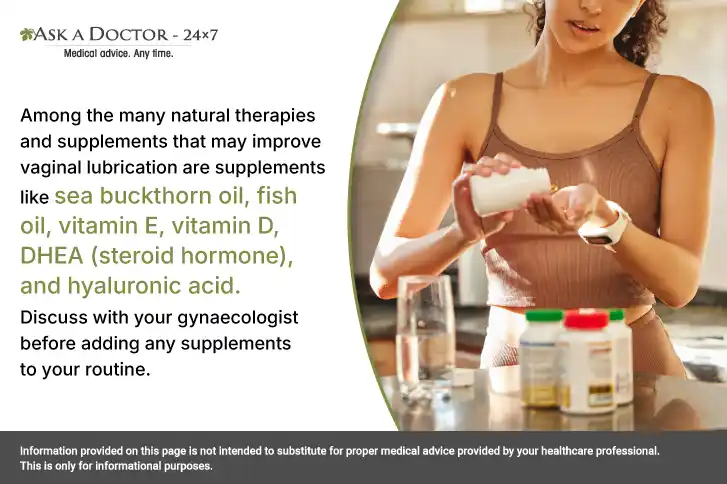How To Increase Vaginal Lubrication Naturally?
Our body naturally produces vaginal lubrication, primarily consisting of water and acids. It is a natural, estrogen-dependent fluid produced by the body that lubricates the vagina during arousal, facilitating comfortable intercourse. This lubricant is also essential for shielding the vaginal region from inflammatory substances and for easing burning and pain, which in turn improves the comfort of sexual activity. Along with these advantages, vaginal lubrication also helps women reduce fungal irritation, balance moisture, control pH, and make it easier for sperm to get to the uterus, all of which increase the likelihood of conception.
However, in some cases, natural lubrication is reduced due to factors like menopause, childbirth, stress, or certain drugs. In such cases, artificial lubricants or lifestyle modifications, such as adequate hydration, dietary adjustments, and pelvic exercise, can be used to reduce dryness. Let’s discuss tips to increase vaginal lubrication.
Symptoms of Vaginal Dryness
Lack of vaginal lubrication can cause vaginal dryness. Early diagnosis and successful treatment can be facilitated by recognizing the symptoms of vaginal dryness.
Some typical signs and symptoms include:
- Burning or stinging sensation in the vaginal area
- Vaginal itching
- Pain or discomfort during sexual activity
- Light bleeding after intercourse
- Frequent urinary tract infections (UTIs)
- A persistent sense of dryness or pressure
- Increasing the risk of gynecological diseases, like vaginitis and vulvar and cervical infections
Causes of Vaginal Dryness

Causes of vaginal dryness and inadequate lubrication are as follows:
- Changes in hormones: Decreased estrogen levels can be triggered by stress, childbirth, breastfeeding, or menopause.
- Medication: The body's capacity to produce lubricant may be affected by certain drugs, including anti-estrogen medications, antihistamines (used for cold and allergy relief), some antidepressants, hormonal contraceptives, and cancer treatments.
- Medical problems: Vaginal dryness can also result from some medical issues, like Sjögren's syndrome, surgery to remove the ovaries, or undergoing a hysterectomy (removal of the womb).
- Lifestyle factors: Smoking, stress, and anxiety, douching, or using scented soaps can irritate the vaginal area and disrupt its natural lubrication.
Ways To Increase Vaginal Lubrication Naturally
Let’s discuss key tips to increase vaginal lubrication naturally:
1. Stay Hydrated: Your body needs water to create cervical mucus. Hence, drink at least 8-10 glasses of water daily to maintain moisture in all body tissues, including vaginal tissues.
2. Reduce stress: If you wish to improve natural lubrication, you must reduce tension. Stress makes it harder to get moist by obstructing blood flow to the vagina. Therefore, schedule time each day for rest. Take a walk, practice yoga, meditate, or have a cup of tea.
3. Use Natural Lubricants: Hydration in the vagina can be maintained by the use of vaginal moisturizers and lubricants. Lubricants and moisturizers are available without a prescription and can be bought at pharmacies or supermarkets. They assist in reducing sex-related pain by moistening and rehydrating your vaginal tissue. Use coconut oil, aloe vera gel, or vitamin E oil on the external vaginal area. These are similar to natural lubrication and should be applied to the area around the lips (vulva) and vagina just before sexual intercourse takes place. Also, aloe vera gel, when used externally, is well-known for its calming and moisturizing qualities, which help reduce inflammation and hydrate the vaginal tissues. The antioxidants in vitamin E oil can lessen dryness and support tissue health. A tiny quantity of the oil can be used for its restorative and moisturizing properties in and around the vagina.
4. Indulge in Regular Exercise: Engage in regular physical activity and pelvic floor exercises to improve muscle tone and blood flow to the pelvic region. Strengthening weak pelvic floor muscles through Kegels involves the pelvic floor muscles to lift, hold, and then relax them. While sitting on the toilet, practice stopping the flow of urine to identify these muscles. Gradually, increase the length of time and number of exercises in each session after starting with a few repetitions.
5. Incorporate Lifestyle Changes: It is essential to bring certain changes in your lifestyle, such as:
- Avoid staying up late and get eight hours of sleep each day
- Wear loose clothing, especially comfortable elastic underwear
- Properly clean the genital area
- Avoid holding pee in for too long
- Have frequent gynecological exams
- Cleaning the area thoroughly after sex
6. Eat phytoestrogen-rich foods: Consuming foods high in phytoestrogens, such as sesame seeds, flax seeds, and soy, may make your vagina more lubricated. Plant substances known as phytoestrogens replicate the physiological effects of estrogen. According to research, phytoestrogens can help menopausal women with symptoms of low estrogen, such as a dry vagina.
7. Get Some Foreplay: Sufficient stimulation and foreplay can increase natural lubrication. by increasing blood flow to the genital area and releasing feel-good hormones like oxytocin, which enhances arousal and makes sex more comfortable and enjoyable.
Conclusion
The vagina shouldn't cause discomfort, and having sex shouldn't hurt. Vaginal dryness can affect lubrication and can be quite upsetting or distressing for a woman. A medical expert, like a gynecologist, can assist in identifying the source of the dryness and then suggest an appropriate remedy. If vaginal dryness does not improve after using a commercial lubricant or if it continues, you can consult a gynecologist for an accurate diagnosis and appropriate treatments, such as lubricants or hormone therapy.
If you have any questions related to vaginal lubrication, consult our Gynecologist at Ask a Doctor - 24x7.
Recently Answered Questions Related to Vaginal Lubrication
Disclaimer: Information provided on this page is not intended to substitute for proper medical advice provided by your healthcare professional. This is only for informational purposes.
Ask a Specialist
Recent Questions


